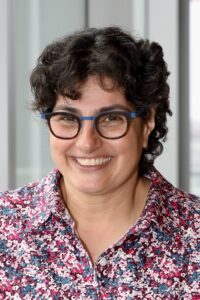Letter from the Dean

Photo by Allegra Boverman. School of Science Dean Nergis Mavalvala.
Hello, my dear fellow alumni and friends,
Never would I have imagined that the cover title of our magazine would need to convey a message as directly as “Research Heals Lives.” Because of course it does. Scientific inquiry has been the foundation of our prosperity, health, and leadership as a nation in the world. And in this moment, that preeminence is at risk as we at MIT and other leading research universities and institutes are under threat. Federal cuts to research funding and programming will have direct and dire consequences on the global scientific enterprise that has served us at MIT, the nation, and all of humanity.
And yet, our spirit of curiosity and inquiry remains unbounded here at MIT.
In this issue, we take an in-depth look at the recent coalescing of fundamental research in the life sciences. As one of President Sally Kornbluth’s primary initiatives, the MIT Health and Life Science (HEALS) Collaborative aims to catalyze discovery, innovation, and impact for human health.
The MIT HEALS Collaborative will pursue ambitious goals seeking to make transformational advances in AI and life science, low-cost diagnostics, neuroscience and mental health, environmental life science, food and agriculture, the future of public health and health care, and women’s health.
And all of that begins with fundamental research of the kind only we can do here at MIT School of Science. In addition to reading about the HEALS launch event, we’ve gathered research stories about some of our recently tenured MIT Science faculty who are working in the areas of fundamental life sciences research and potential for impacting human health.
You can read our exclusive interview with alumna Nancy Andrews, MD, PhD, the Executive Vice President and Chief Scientific Officer of Boston Children’s Hospital, about her MIT journey and the importance of fundamental research as the root of advancing the MIT HEALS mission.
You can also read about the new Hood Pediatric Innovation Hub, spurred by the HEALS Collaborative, which aims to break down barriers to pediatric innovation and foster transformative research to improve children’s health outcomes.
I am truly excited to see what new collaboration and innovations MIT HEALS brings forward as our researchers apply for seed grants to continue our important research in the life sciences.
And lest you think the issue is entirely focused on life sciences research, learn more about how our climate science efforts are proceeding through the newly dedicated Center for Sustainability Science and Strategy. Those of you who joined our breakfast talk this past April were treated to a lecture by Professor Noelle Eckley Selin, recently inducted in to the American Association for the Advancement of Science. (AAAS) Through her work as director of CS3, Noelle sees climate science as inherently linked with the sociopolitical organizations and structures that determine how that research is used or implemented.
You can read a profile of Jess Speedie one of eight recipients of the 2025 51 Pegasi b Fellowship provided by the Heising-Simons Foundation. Speedie’s work has focused on understanding “cosmic nurseries” and the detection and characterization of the youngest planets in the galaxy.
Like Selin and Speedie, our faculty and their graduate students and postdocs are investigating the answers to fundamental scientific questions, generating new knowledge to ask the next set of questions. Sometimes these answers lead us to unexpected connections across fields, new frameworks or tools for inquiry, and sometimes, direct applications to areas of immediate interest or concern, such as mitigating the effects of climate change, utilizing AI in new and beneficial ways, and improving human health.
And sometimes? Fundamental scientific research doesn’t make these applications known immediately. Sometimes, it might be decades… and but it is rarely “never.” The value of inquiry, curiosity, the seeking out of answers and the creation of knowledge powers prosperity.
We are at a moment in time where funding for research that has produced the greatest scientific enterprise in the world is uncertain at best. We at MIT remain committed to supporting the research programs here, including those you’ll hear about this evening, that allow this freedom of scientific inquiry that has led to the most important discoveries the world has yet known.
As always, I hope you will come to campus soon to see, in-person, the contributions that we in the School of Science are making on behalf of us all.
With my very best wishes,
Nergis Mavalvala, PhD ‘97